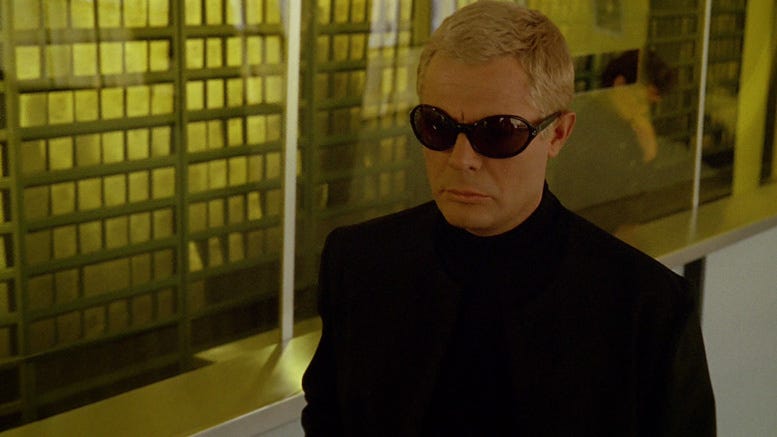The Overdone Window
You Can Have The "New" When It's Ready To Become "Old"
Welcome to an entry “From The Future”.
This is a riff-in-progress. What you’re reading will not remain the same. It will change. (Author’s note: I have been ill, with a few weeks of eye strain, and I have opted to write a short piece, to start the core of a piece about “Change”.)
Future + Fiction is the formula for everything, whether it’s an essay, story or chapter.
Many pieces are best read online, via Substack App, within fifteen minutes.
This is a message and reminder to everyone who has to deal with the future (which is everyone): You can’t have the “new” until it’s ready to become “old”.
For the new to displace the old, one window, open to the future, must expand, but before it can, another window, looking back to the past, must contract. This is the nature of change.
This includes, health, wealth, love, losing, and living. The most static constants in our world are in fact the best reminders of how much change there is. Just look at some of the greatest (surviving) works of humanity. Every single one of these artifacts were new, strange, and alien if one goes back far enough. And then, they became part of the old.
A “buy-and-hold” index portfolio contains bundles of change underneath the top line. Networks of world straddling, trading leviathans of wood and gun-powder gave way to copper-based, steam-powered, cable-line toll-bridge empires, and then to photon-based satellite and fiber silicon platforms.
The “World Order” is not the same one from a half-century ago, never mind a century ago. Every global titan has been the survivor of an endless turnover which in recent centuries displaced a rolling collection of monarchial kingdoms entangled through marriages and treaties.
Some of the organs within each of us regenerate, shedding and replacing cells constantly, and yet the self remains. Cities rise and fall, most are lost and forgotten, and yet civilization continues. Our cosmos travels on a slow arc of transformation over the eons, where stars are born and die, but their light survives long after their passing.
These bodies of reality retain their forms but nothing remains fixed.
Reality is a “Ship of Theseus” which looks the same up close, from moment to moment, but it is also a vessel of constants when studied from a distance.
We created and lost languages, saying most of the same words, for the same things, again and again. Along the way, however, we do add new words to the pile. BUT it takes time.
Over time, change adds to a growing pile of new constants. In recent years, one recent addition to the vocabulary is “the Overton Window”.
The “Overton Window” is defined as “the range of policies politically acceptable to the mainstream population at a given time”.
This applies to many things. I would say it applies to near everything you and I assume are “the way it has always been”. Go back a year, a decade, a century, and we begin to notice just how much of what we take for granted was new.
Think of the simplest things we do, and most of it was at one point, considered new and strange. All these new things passed through an Overton Window, and all the newness and strangeness was drained out of them. But there was another stage they had to pass through, another earlier window.
I suggest that there is an “Overdone Window”, which does two things:
First, we forsake something old, an old norm or way of doing things.
Second, we forgive the new thing, which at first captivated us but then bored us and/or broke our hearts and wallets.
It’s not enough to introduce something new, shiny, and wonderful. It’s not enough for novelty to take hold of attention, focus, and finally time.
When something new is “everywhere all once”, a begrudging “been-there-done-that” exhaustion sets in. Ennui sets in, passions fade, and the old tried and tested remains in our good graces. If something new becomes exhausted easily and quickly, then we’re at the “Overdone Window”.
Passing fancies which overpromises, underdelivers, and disappoints us, bruises our competitive and mimetic attention. We become repentant, rediscover old flames, and wistful nostalgia grows. Our collective muscle memories flex for “the old way”. We’re sore from overdoing the new.
Time is needed, and patience is needed to heal us.
And then, some of the new will have its chance to become the new “old way”. It survives and endures just long enough to become the next “tried-and-tested’ and “the-way-it-has-always-been”.
We’ve seen boom and bust, and watched as spring became a summer of love, only to be frozen to death in a long winter, as many a “new new thing”, mood, movement, and mechanism, gathers dust and regrets on the shelves, and stays there. Over time, however, some of the new becomes custom and norm.
The Overton Window scales up the new ranges.
The “Overdone Window” shrinks the old ranges. The “old”, along with the broken prototypes for “new”, is put on a shelf of quaint antiquities, which prompt the shaking of heads, and murmurs of “whatever were we thinking at the time?”. This second Window shelves both “Old” and "New also rans”.
Every new thing has to wait on an invisible line of acceptance. Not all make it.
Welcome, something “new-and-spectacular”, you will be promoted to the role of the next “the way it’s always been”. It took long enough, because it takes time.
Please move along.
You may now take your application over to the window marked “Overton”.





Nice. It is good to go a wondering within the mind; it helps keep things in perspective. And who knows, you might just create a wrinkle or two